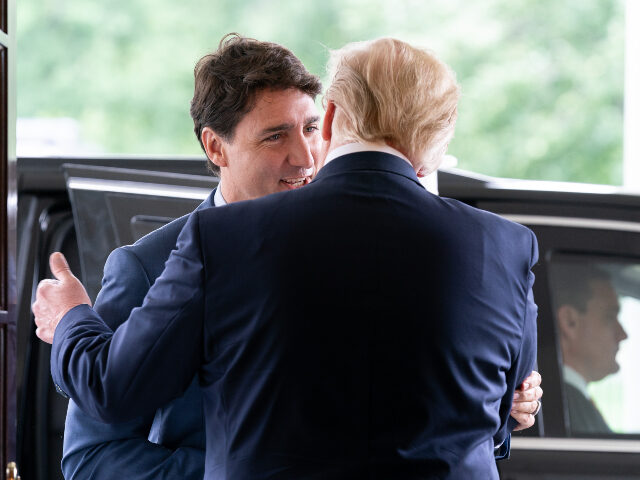Canadian Conservative Party Leader Pierre Poilievre told reporters on Sunday that he felt “badly” watching leftist Prime Minister Justin Trudeau make the rounds at President-elect Donald Trump’s estate Mar-a-Lago, lamenting his “position of weakness” and describing Trudeau as having “lost control.”
Trudeau was in Florida for a surprise dinner with Trump on Friday night following an explosive message Trump posted last week to his social media website Truth Social in which he vowed to implement a 25-percent tariff on Canadian and Mexican goods until both countries helped America curb mass migration and drug trafficking. The message caused alarm in Canada, which sends nearly 77 percent of its exports to the United States.
In Mexico, leftist President Claudia Sheinbaum responded to Trump with the threat of imposing her own tariffs on American goods, ultimately holding a call with Trump that lowered tensions between the two. Trudeau, however, did not immediately comment on the matter and later claimed to hold a “good call” himself with Trump, leaving politicians both to the left and right of the prime minister concerned that he was not taking the matter seriously enough.
Both Trump and Trudeau described their encounter in Florida as productive, but divulged few details on any agreement, a result that Poilievre, speaking to reporters, lamented as not securing any deliverables for Canada.
“While I’m a critic of Mr. Trudeau’s, I did feel badly that he went in with such a position of weakness,” Poilievre said on Sunday. “Normally when a prime minister goes to the United States to meet a president, they’re looking to make gains. What gains did we hear from Mr. Trudeau? None, he’s just trying to limit losses.”
“All Justin Trudeau offers is minimizing losses,” he continued. “This is the consequence of having a weak prime minister who has lost control: lost control of our borders, lost control of immigration, lost control of crime and drugs, and lost control of our economy.”
“Canadians are paying a dreadful price for everything that Justin Trudeau has broken,” he concluded.
Trudeau arrived on Florida on Friday evening and attended a dinner with the president-elect alongside a small selection of his cabinet, including Minister of Public Safety Dominic LeBlanc, who described the gathering as “a very warm, cordial meeting.”
“I saw very much the mutual respect and warmth between the two leaders,” LeBlanc said in an interview following the encounter.
Trudeau posted a photo to his social media accounts alongside Trump thanking him for his reception, adding, “I look forward to the work we can do together, again.”
Trump described his meeting with the Canadian leader as “very productive” in his own social media message on Saturday.
“We discussed many important topics that will require both Countries to work together to address,” Trump wrote, “like the Fentanyl and Drug Crisis that has decimated so many lives as a result of Illegal Immigration, Fair Trade Deals that do not jeopardize American Workers, and the massive Trade Deficit the U.S. has with Canada.”
“I made it very clear that the United States will no longer sit idly by as our Citizens become victims to the scourge of this Drug Epidemic, caused mainly by the Drug Cartels, and Fentanyl pouring in from China,” he added. “Too much death and hardship!”
Trudeau was home by Saturday morning. The Globe and Mail noted that, while Trump and Trudeau both described their meeting positively, Trudeau returned “without any guarantees that Mr. Trump would drop the tariffs.”
Trump promised in late November that he would impose a 25-percent tariff on both Canada and Mexico.
“On January 20th, as one of my many first Executive Orders, I will sign all necessary documents to charge Mexico and Canada a 25% Tariff on ALL products coming into the United States, and its ridiculous Open Borders,” he asserted on Truth Social. “This Tariff will remain in effect until such time as Drugs, in particular Fentanyl, and all Illegal Aliens stop this Invasion of our Country!”
“Both Mexico and Canada have the absolute right and power to easily solve this long simmering problem. We hereby demand that they use this power,” he concluded, “and until such time that they do, it is time for them to pay a very big price!”
While Poilievre was naturally the most critical Canadian politician of Trudeau’s visit to Mar-a-Lago, several regional leaders in Canada indicated over the weekend that they would independently be pursuing the economic interests of their provinces in the absence of solid leadership out of Ottawa.
“We’re saying to the Americans, we are your solution to energy security. We are your solution to energy affordability,” Alberta Premier Danielle Smith said on Sunday, lamenting onerous taxes on fossil fuels imposed by Trudeau’s government. “You can’t take that message to the table when you’ve got these additional taxes and production caps layered on top.”
“We have to have a cohesive message, and part of this is going to be a bit of a climbdown for Justin Trudeau and some of the bad policies that he’s enacted over the last number of years,” she added, according to Canada’s Global News.
The premier of British Columbia, David Eby, told reporters in response to the original Truth Social post that his province would seek independent “opportunities” to trade with America, hopefully exempt from the proposed 25-percent tariff.
“We’re going to continue to do our work to expand those trading opportunities,” he promised, calling British Columbia’s past efforts to also seek other markets outside of America “definitely the right direction” and that he would seek other markets “given the instability south of the [Canadian] border.”
Ontario has already began an advertising campaign for its markets separate from the rest of Canada. Premier Doug Ford launched an ad campaign, Global News reported on Saturday, worth tens of millions of dollars to highlight Ontario as a “key trading partner,” apparently independent of the rest of Canada.

COMMENTS
Please let us know if you're having issues with commenting.